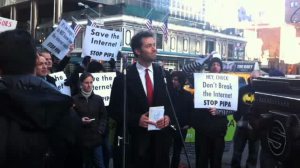
PIPA and SOPA Votes Shelved. Your Move, Web.
[Source: GigaOm, by Stacey Higginbotham, January 20, 2012]
 Update: After this story was published, the House Judiciary chairman and co-sponsor of the Stop Online Piracy Act (SOPA) also said he would postpone the vote to bring SOPA out of committee (it’s buried at the bottom of his statement on the Protect IP Act here). The story has been updated to reflect his change of heart, and I reached out to confirm that the vague wording in the statement means this is really permanent. The statement reads, “The House Judiciary Committee will postpone consideration of the legislation until there is wider agreement on a solution.”
Update: After this story was published, the House Judiciary chairman and co-sponsor of the Stop Online Piracy Act (SOPA) also said he would postpone the vote to bring SOPA out of committee (it’s buried at the bottom of his statement on the Protect IP Act here). The story has been updated to reflect his change of heart, and I reached out to confirm that the vague wording in the statement means this is really permanent. The statement reads, “The House Judiciary Committee will postpone consideration of the legislation until there is wider agreement on a solution.”Update: Sen. Harry Reid (D-Nev.), will postpone the scheduled vote on the Protect IP Act (PIPA) set for next Tuesday in the Senate. The move is a small big victory for the millions of people and hundreds of companies that oppose the intellectual property bill on the grounds it is too far-reaching in its attempts to curb piracy. In a statement put out Friday morning, Reid said:
“There is no reason that the legitimate issues raised by many about this bill cannot be resolved. Counterfeiting and piracy cost the American economy billions of dollars and thousands of jobs each year, with the movie industry alone supporting over 2.2 million jobs. We must take action to stop these illegal practices. We live in a country where people rightfully expect to be fairly compensated for a day’s work, whether that person is a miner in the high desert of Nevada, an independent band in New York City, or a union worker on the back lots of a California movie studio.”
The protests that rocked the web on Wednesday and resulted in 13 million Americans taking some form of action to protest PIPA and its companion bill in the House, the Stop Online Piracy Act (SOPA), have been essential for swaying legislative opinion on the issue. Behind the scenes, tech industry leaders have been discussing the issue with congressional staffers and legislators in an effort to educate them about the effects of the legislation and more broadly about how the Internet works at a technical and business level.
Meanwhile, activists and the tech community are urging Congress to start over with a new bill, perhaps the recently introduced Online Protection & Enforcement of Digital Trade Act (OPEN) proposed by Rep. Darrell Issa (R-Calif.), which is already gaining support among companies that include Google and Facebook. The act takes a different view of IP theft, regarding it as a trade issue and attempting to attack the problem using the International Trade Commission as a vehicle for judgment as opposed to seeing the Internet as a vast wasteland of infringing sites that rights holders could take down at the slightest provocation. There are plenty of people in the tech industry that are unsure if any IP protection is necessary, but as the recent FBI raid on video-sharing site MegaUpload shows, this is an area that the government isn’t going to ignore.
Update: Sen. Patrick Leahy (D-Vt.), the sponsor of PIPA, is unimpressed with the move. He pointed out this is a bill Senators had read back in May and approved, and called their change of heart in the wake of the wide-scale protests a “knee-jerk reaction.” He issued a statement that tied the IP issues addressed by the bill to Congress’ favorite flagpole: jobs. In his statement he said,
“But the day will come when the Senators who forced this move will look back and realize they made a knee-jerk reaction to a monumental problem. Somewhere in China today, in Russia today, and in many other countries that do not respect American intellectual property, criminals who do nothing but peddle in counterfeit products and stolen American content are smugly watching how the United States Senate decided it was not even worth debating how to stop the overseas criminals from draining our economy.”


